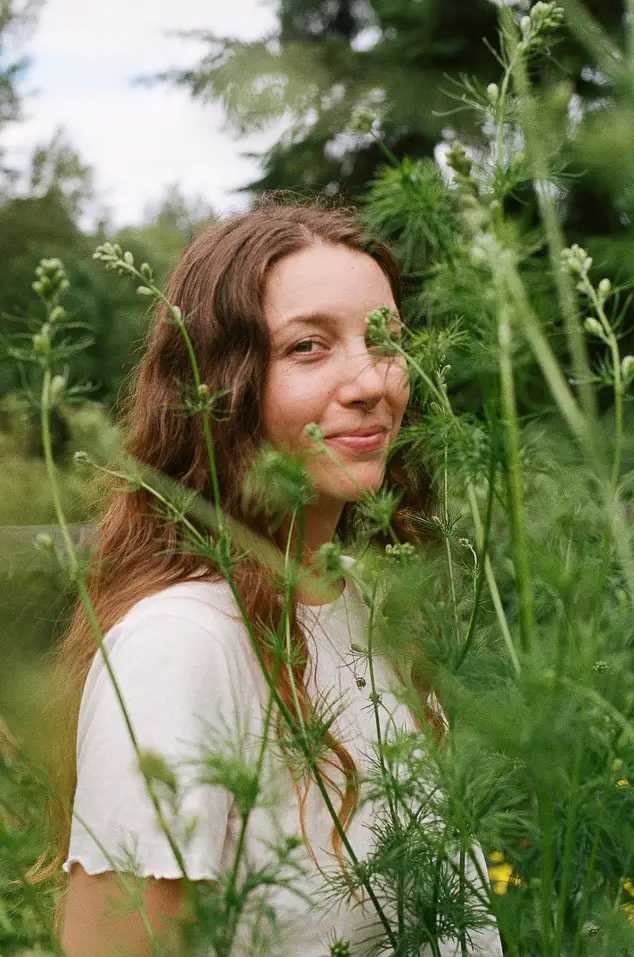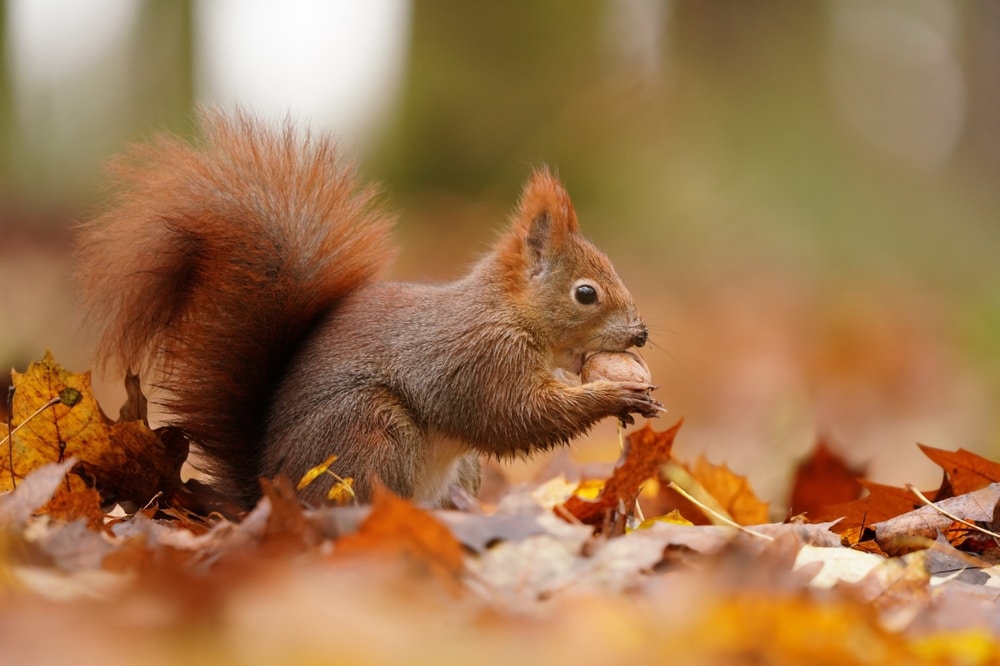Did you know squirrels are notable pollinators, tree planters, and gardeners of the natural world? If you’ve ever wondered “What do squirrels eat?” then you’re in the right place!
Squirrels are common in backyards across North America. While often seen as pests, they play an important role in the seed dispersal of many native trees and shrubs, helping to maintain healthy ecosystems!
I once had mixed feelings about these creatures. When I lived on Vancouver Island, gray squirrels were invasive, negatively impacting native red squirrel populations. Overpopulated and competitive for resources, they influenced my initial bias against them.
However, after moving, my perspective shifted. There’s a squirrel on our block with a short tail, lopped off into a nub, and my heart immediately grew three sizes! This sparked my desire to learn more about these amazing animals and their contributions to our environment.
In this article, I’ll explore what squirrels eat, their essential role in the regenerative food chain, and how we can coexist with them in a natural and healthy way.
Overview Of Squirrel Diet And Habits
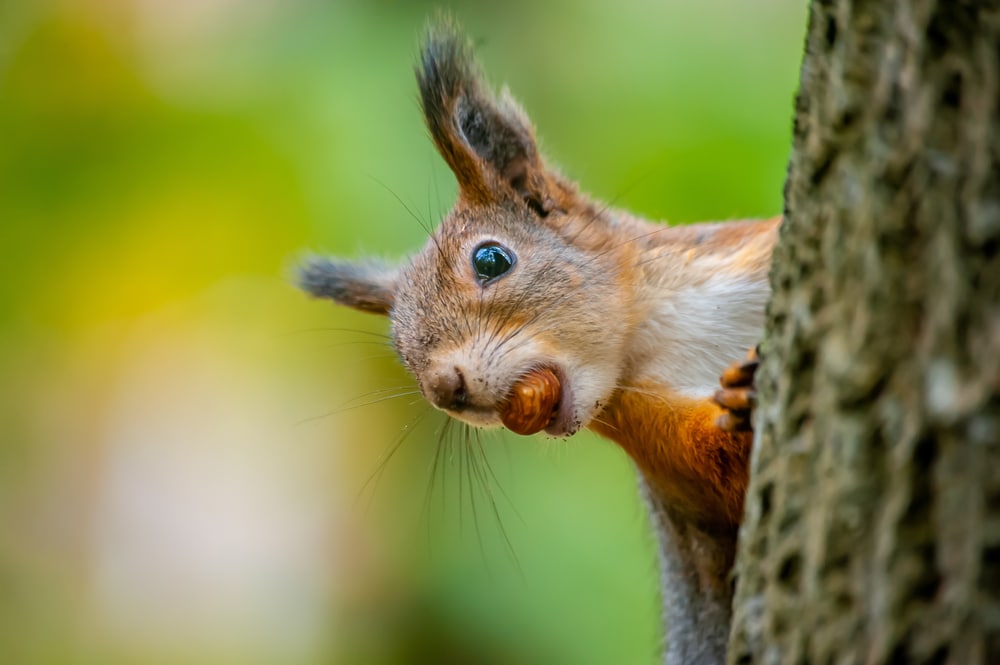
Squirrels are omnivores with an opportunistic foraging eating habit. They have a wide range in their diet, from seeds and nuts to insects, amphibians, and even nestling birds. Their diet habits evolve and change as the seasons do. Squirrels eat more in the fall and store food in many small caches in preparation for winter. This strategy is called scatter-hoarding. This is where squirrels have multiple cache sites over a wide area.
What Do Squirrels Eat?
The majority of a squirrel’s food preferences are nuts and seeds. They also love flowers and buds from trees. If their main food source becomes depleted they will opt for animal-based materials. Keep reading to discover what specific foods squirrels eat.
Nuts Squirrels Eat
Squirrels love nuts! In particular, nuts with their shells left on. Squirrels’ teeth are continuously growing, so the shells give them something to gnaw on to keep their teeth healthy and trimmed.
Nuts provide squirrels with protein, healthy fats, fibers, and minerals.
Squirrel nut preferences include:
- White oak acorns
- Walnuts
- Hazelnuts
- Pecan
- Hickory nuts
- Beechnuts
Fruits for Squirrels
The fact that squirrels love fruits can be either garden-friendly or problematic! If you cultivate fruits like strawberries or grapes, you may find your squirrel neighbors munching away. This can lead to reduced yields and damaged fruits. One way to mitigate this is to cover your fruit in bird mesh. This also protects the plant from any unwanted pests.
Fruits that squirrels love include:
- Apple
- Cantaloupe
- Grapes
- Strawberries
- Watermelon
Squirrels Eating Insects
Insects provide squirrels with protein. If fruits and nuts aren’t readily available, squirrels are more likely to supplement their diet with insects. Types of insects commonly consumed:
- Caterpillars
- Crickets
- Grasshoppers
- Butterflies
- Larvae
- Cicadas
- Grubs
- Worms
Other Food Squirrels Eat
Another form of organic material that squirrels eat is animal matter! This is generally species-specific. Some people think that all squirrels eat the same thing. This is a common misconception about squirrels. The red squirrels are known to be herbivores, while the gray squirrels are known to be omnivores. Some animals that gray squirrels will opportunistically eat include:
- Amphibians
- Small mammals, like mice or moles
- Bird eggs
- Nestlings birds
Squirrels also love mushrooms! They are known to substantially contribute to the population expansion of mushrooms, including truffles! This is through eating and digesting fungi, and then pooping out fungal spores into new locations!
Have you ever seen a mushroom perched upside down in a tree? This is a squirrel! They perch mushrooms in trees to dry them out. Then, they cache the mushrooms for winter.
Seasonal Diet Of Squirrels
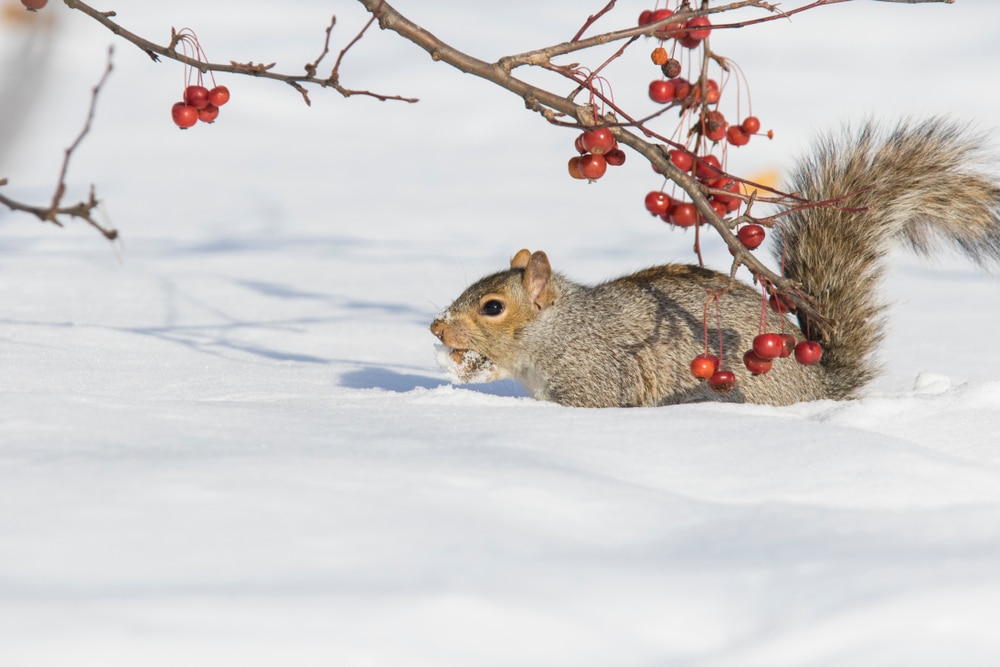
Squirrels are opportunistic foragers, and their diet changes with the seasons. They eat what is available seasonally within their habitat.
In the early spring squirrels focus on a high protein diet. This is because they are just coming off of the winter season. During this time they are surviving off reserved fats and stored food. A high protein diet in the spring helps them gain energy quickly and gain weight back after the harsher cold months. Protein-rich food for squirrels in the spring includes insects like:
- Worms
- Larvae
- Grubs
What do squirrels eat in the summer depends on where they are and their species. But, in general, during the summer they’ll take advantage of a wide variety of fruits, vegetables, and even flowers!
During autumn and late summer, squirrels start to cache their food in preparation for winter. They also start to gain weight for the upcoming winter season. This diet includes lots of high fat and sugar content. Foods like nuts, seeds, fruits and fungi will be eaten in abundance! Squirrels do not hibernate and will forage throughout the entire winter.
Common Misconceptions About Squirrels
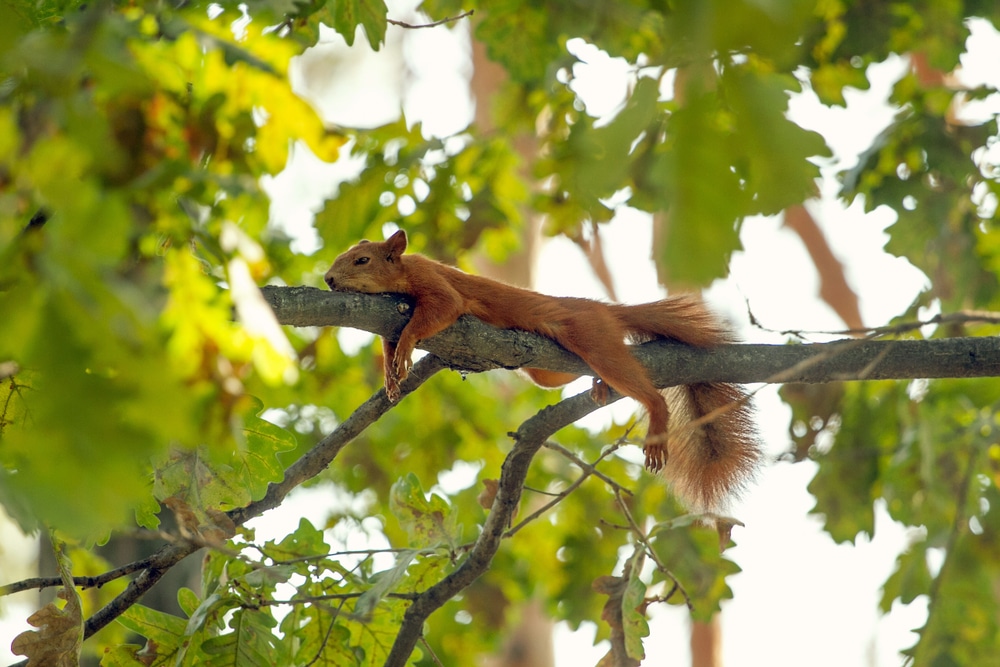
There are a lot of common misconceptions about squirrels. They get a bad rap in the neighborhood because of their ability to steal your garden tomatoes or nest in your attic. They may dig holes throughout your garden, but did you know that in doing so, they are spreading seeds of many beneficial plants?
Red vs Gray Squirrels
Another misconception is that gray and red squirrels are the same species. They are actually quite different! Gray squirrels can have a negative impact on red squirrel populations.
So, how are they different? Gray squirrels are prone to live in areas with high anthropogenic disturbances. You are more likely to find them in urban areas where they eat more man-made foods. Gray squirrels are omnivores and scavengers, opting for a more diverse diet.
Red squirrels are often found in the forest, far removed from areas of anthropogenic disturbance. They are herbivores, eating mostly plant matter for their diet.
Gray squirrels out-compete red squirrels in areas where gray squirrels are considered invasive. They are native to the east coast but have been introduced to other regions of North America. Gray squirrels also contract and spread the squirrel parapox virus. Gray squirrels are immune but this virus is known to cause long, painful deaths for the red squirrel.
Garden-Friendly Squirrel Food
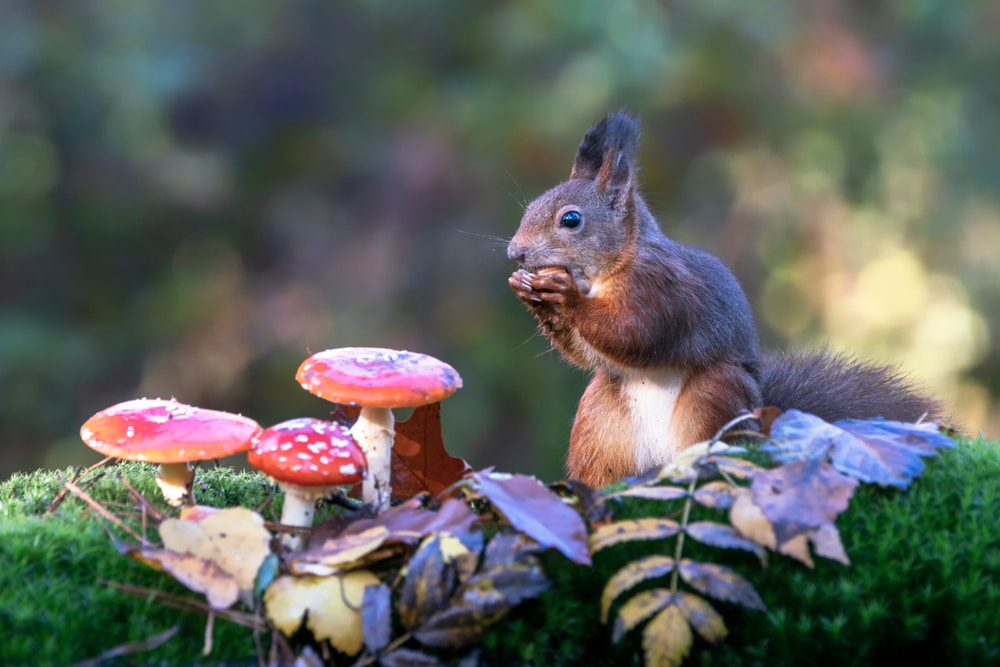
There are many things you can cultivate in your garden that draw in and feed squirrels. Some squirrel food that benefits your garden includes sunflowers. Watch them climb the stocks like acrobats to reach the seeds! Best foods to attract squirrels are native trees like oaks.
Do Squirrels Eat Fruits And Vegetables?
Yes, squirrels definitely eat fruit and vegetables! Some of best foods to attract squirrels with:
- Corn
- Squash
- Grapes
- Peas
- Strawberries
- Apples
- Carrots
- Zucchini
- Pumpkin
Squirrels are often seen as pests because of their love of prized cultivated foods, especially for the varieties above. Keep reading to discover ways to live harmoniously with these creatures.
How To Feed Squirrels In Your Garden
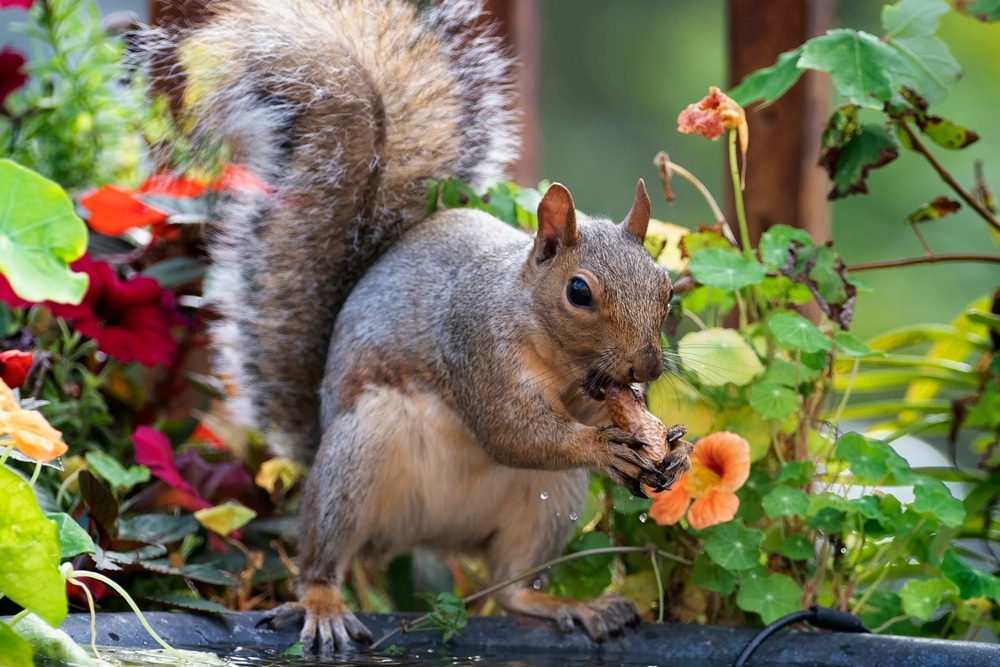
You may be thinking “Why would I want to draw squirrels in with these foods?” or “Won’t they just destroy my garden and eat my produce?”
But, let me tell you, it is possible to live in harmony with squirrels while still cultivating fruits and veggies for you and your family.
Squirrels are very common so why work against squirrels when you can work with them? There are many ways to attract squirrels without damaging plants.
A great way to distract squirrels from your crops is by creating separate feeding areas, specifically for the squirrels. Attach platform feeders to trees or posts, giving easy access to squirrels. My favorite way to feed the squirrels in your garden is the squirrel picnic table. It’s a platform feeder in the form of a miniature picnic table!
Another way is to use bird netting to cover your fruiting shrubs or trees. You can also build aesthetically pleasing raised beds with chicken wire tops, to make sure squirrels can’t reach your quality crops.
If you want squirrels to leave your bird feeders alone, try adding seeds like safflower seeds, nyjer seeds, or white proso millet. Squirrels don’t have the palette for these varieties. Another deterrent is cayenne pepper to the seed mix. Birds can’t taste this spice but the squirrels do!
Squirrel Food That Benefits Your Garden
The best squirrel food that benefits your garden is plants that benefit the native ecosystem around you. Squirrels are notable pollinators, aiding in the seed dispersal of many important native flowers, shrubs and trees. They help to expand populations of valuable trees, shrubs, and native wildflowers.
They are considered the creators of forests in the animal world. Even though they are seen as pests, they are an integral part of the forest ecosystem.
Growing a native garden helps more than just squirrels. By opting for native plants, you attract many species of birds, bats, and beneficial insects. Check your area for what grows naturally around you. Here is a list of squirrel food that benefits your garden. These trees contribute to strong forest ecosystems around North America.
- Butternut
- Cedar
- Magnolia
- Dogwood
- Elm
- Hackberry
- Hemlock
- Hickory
- Maple
- Oak
- Pine
- Spruce
Best Foods To Attract Squirrels
Besides using native plants to attract squirrels to your garden, the best foods to attract squirrels are:
- Sunflower seeds
- Mealworms
- Corn
- Wheat
- Oats
Add these ingredients to your squirrel picnic table for a well-rounded, healthy diet!
Another feature that helps attract and keep squirrels healthy is elk or deer antlers! Place sheds around your garden to supply squirrels with something to gnaw on. They are great for providing them with calcium. Sheds also help to maintain their teeth and support healthy oral hygiene.
From Pests to Partners: Rethinking Our View Of Squirrels
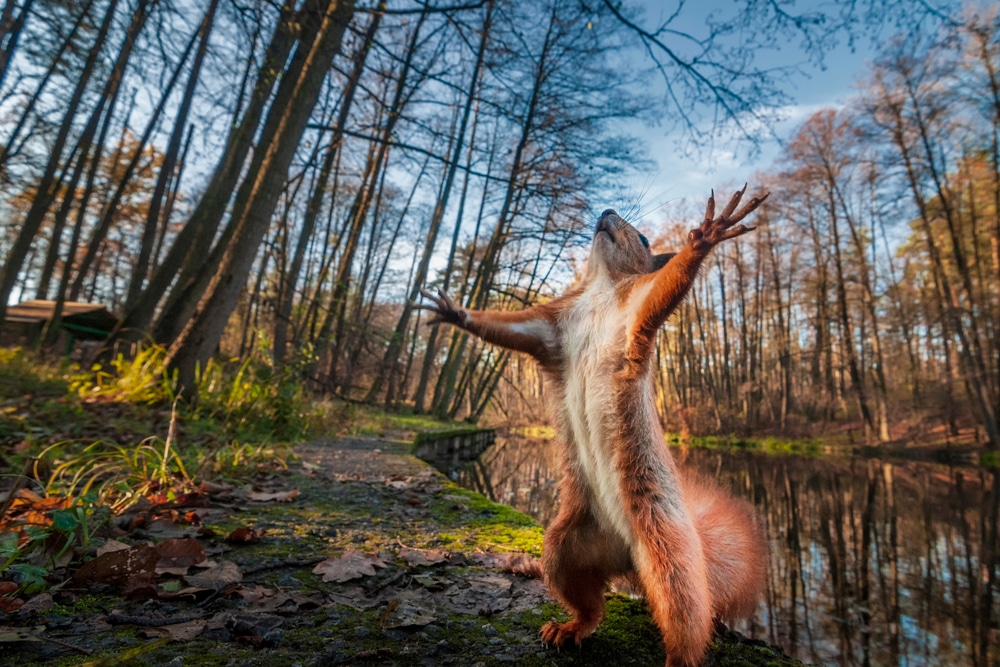
While squirrels may sometimes be pests, they are an integral part of the ecosystem, acting as nature’s gardeners and mini tree planters. By understanding their diets and behaviors we can learn to coexist with squirrels in a harmonious way.
From their essential role in seed dispersal to their diverse dietary preferences, squirrels offer more than meets the eye. By creating squirrel-friendly spaces and cultivating native plants, we can foster a thriving environment for them and other beneficial wildlife.
Next time you see a squirrel, remember to admire it and appreciate the positive impact it has on the ecosystem. I hope this article was enlightening and you learned something new about these common backyard critters!
